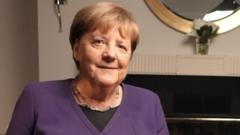In this exclusive interview with Katya Adler of the BBC, Angela Merkel, who led Germany for 16 years, reflects on pivotal global events and her legacy while addressing criticisms of her leadership style and decisions regarding Russia, Trump, and the refugee crisis.
Merkel, often termed one of the most influential leaders of her time, has found herself facing scrutiny post-office, particularly related to her handling of relations with Russia during critical periods including the 2014 Crimea crisis and the ongoing situation in Ukraine. Speaking in Berlin, she articulated her belief that if Ukraine had pursued NATO membership in 2008, it could have triggered even earlier conflict with Russia, arguing that the country was not prepared for such challenges at the time.
This view stands in stark contrast to Ukrainian President Volodymyr Zelensky, who criticized Merkel's NATO decision as a flawed choice that empowered Russian aggression. Her diplomatic efforts during her tenure, including maintaining energy ties with Russia, are now being re-evaluated as Europe reassesses its energy policies following Russia's invasion of Ukraine.
Merkel expressed grave concerns regarding Putin's nuclear threats, emphasizing the necessity of dialogue and diplomacy in preventing nuclear conflict. Her two decades-long relationship with Putin involved negotiation for a lasting peace, yet the subsequent invasion of Ukraine has sparked intense debates on the efficacy of her strategies.
Under her leadership, the influx of over a million asylum seekers during the 2015 migrant crisis drew mixed reviews. While some praised her humanitarian stance, critics argue this decision invigorated the far-right in Germany, contributing to the rise of the Alternative for Germany (AfD) party, now polling strongly ahead of an upcoming election.
Despite acknowledging the AfD's gains, Merkel maintains that her policies were necessary and cannot be solely blamed for broader anti-immigrant sentiments that have resurfaced across Europe. She advocates for stronger investment in African nations to mitigate migration pressures rather than restricting asylum policies.
As she reflects on her economic policies, Merkel admits that Germany's growing dependency on Russian and Chinese trade has come under increased scrutiny. The criticisms of having merely managed crises, rather than enacting transformative reforms, reveal a shift in perception about her leadership legacy.
With uncertainties looming over the political arena, including the potential return of Trump to U.S. leadership, Merkel offers insight on how European leaders might approach future interactions with the U.S. She underscores the importance of clarity and assertiveness in prioritizing issues without succumbing to fears that aggressive rhetoric may provoke.
Merkel's retirement from politics has allowed her a moment to introspect, as she navigates her legacy amid a world increasingly rife with geopolitical tensions, economic difficulties, and rising far-right sentiments across continents. As global leaders seek her guidance, she affirms she has no desire to return to the political arena.
The interview serves as a critical reflection on Merkel’s tenure, her decisions, and their far-reaching impact on both Germany and the world.
Merkel, often termed one of the most influential leaders of her time, has found herself facing scrutiny post-office, particularly related to her handling of relations with Russia during critical periods including the 2014 Crimea crisis and the ongoing situation in Ukraine. Speaking in Berlin, she articulated her belief that if Ukraine had pursued NATO membership in 2008, it could have triggered even earlier conflict with Russia, arguing that the country was not prepared for such challenges at the time.
This view stands in stark contrast to Ukrainian President Volodymyr Zelensky, who criticized Merkel's NATO decision as a flawed choice that empowered Russian aggression. Her diplomatic efforts during her tenure, including maintaining energy ties with Russia, are now being re-evaluated as Europe reassesses its energy policies following Russia's invasion of Ukraine.
Merkel expressed grave concerns regarding Putin's nuclear threats, emphasizing the necessity of dialogue and diplomacy in preventing nuclear conflict. Her two decades-long relationship with Putin involved negotiation for a lasting peace, yet the subsequent invasion of Ukraine has sparked intense debates on the efficacy of her strategies.
Under her leadership, the influx of over a million asylum seekers during the 2015 migrant crisis drew mixed reviews. While some praised her humanitarian stance, critics argue this decision invigorated the far-right in Germany, contributing to the rise of the Alternative for Germany (AfD) party, now polling strongly ahead of an upcoming election.
Despite acknowledging the AfD's gains, Merkel maintains that her policies were necessary and cannot be solely blamed for broader anti-immigrant sentiments that have resurfaced across Europe. She advocates for stronger investment in African nations to mitigate migration pressures rather than restricting asylum policies.
As she reflects on her economic policies, Merkel admits that Germany's growing dependency on Russian and Chinese trade has come under increased scrutiny. The criticisms of having merely managed crises, rather than enacting transformative reforms, reveal a shift in perception about her leadership legacy.
With uncertainties looming over the political arena, including the potential return of Trump to U.S. leadership, Merkel offers insight on how European leaders might approach future interactions with the U.S. She underscores the importance of clarity and assertiveness in prioritizing issues without succumbing to fears that aggressive rhetoric may provoke.
Merkel's retirement from politics has allowed her a moment to introspect, as she navigates her legacy amid a world increasingly rife with geopolitical tensions, economic difficulties, and rising far-right sentiments across continents. As global leaders seek her guidance, she affirms she has no desire to return to the political arena.
The interview serves as a critical reflection on Merkel’s tenure, her decisions, and their far-reaching impact on both Germany and the world.



















